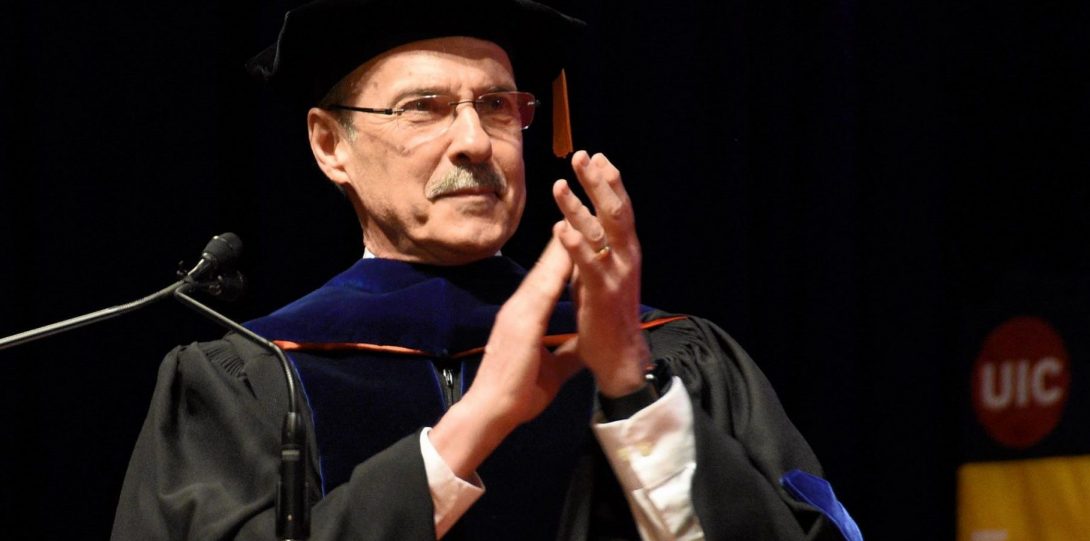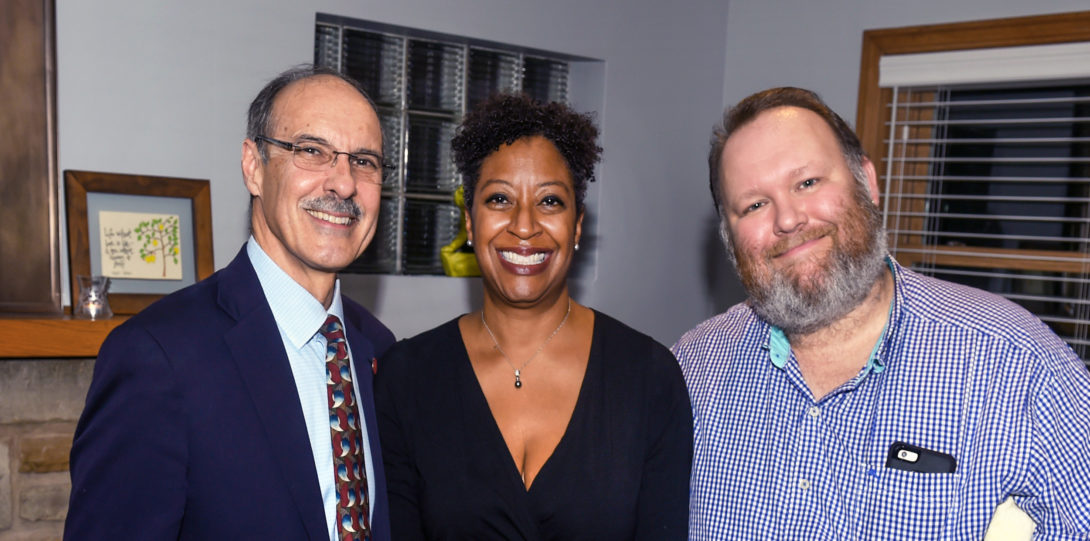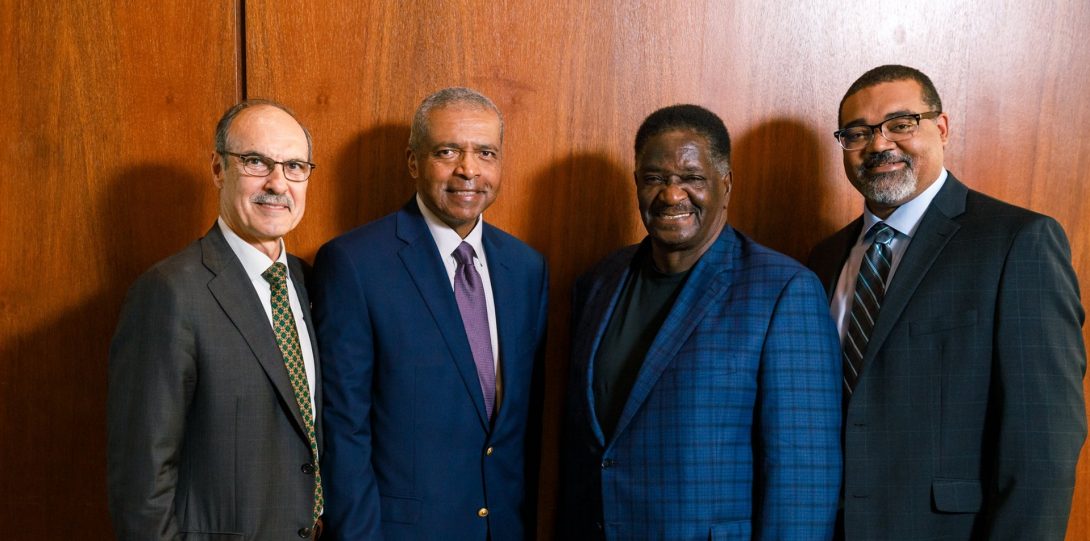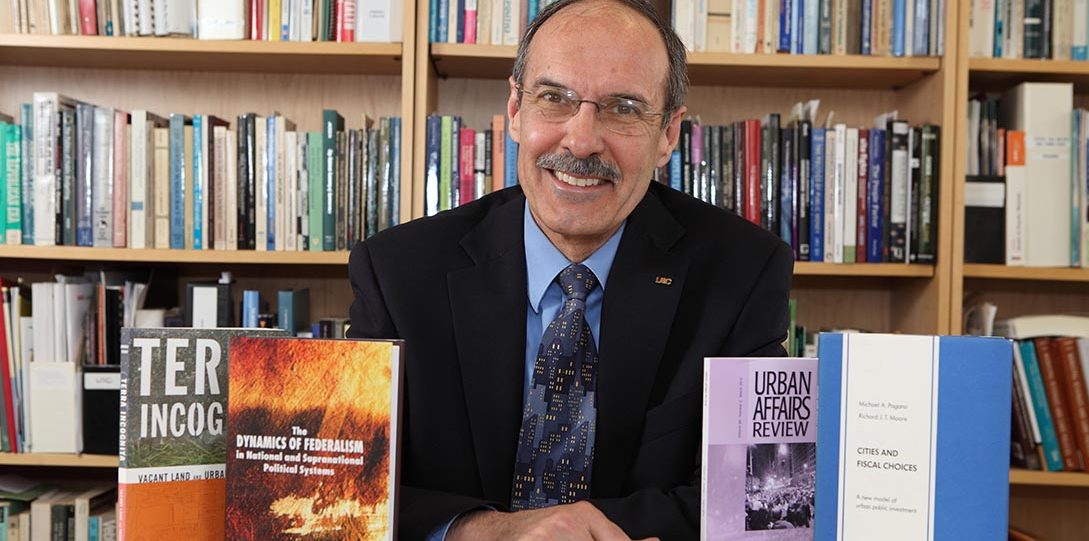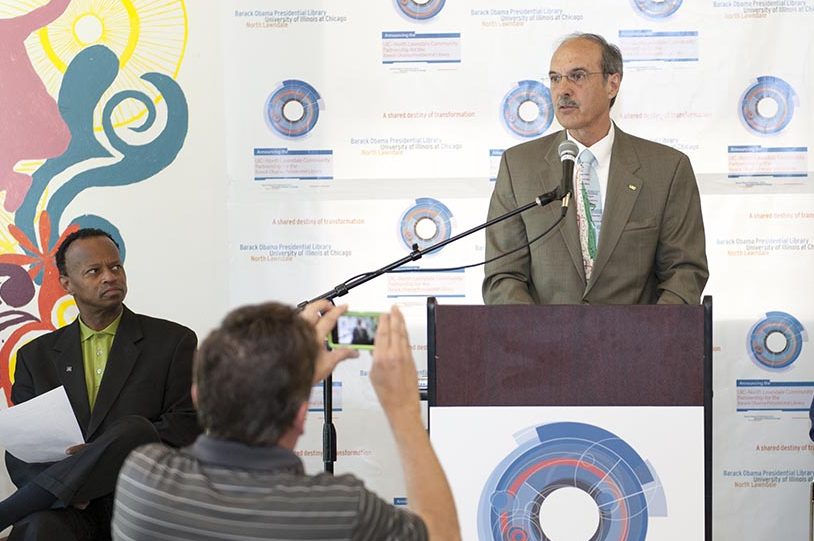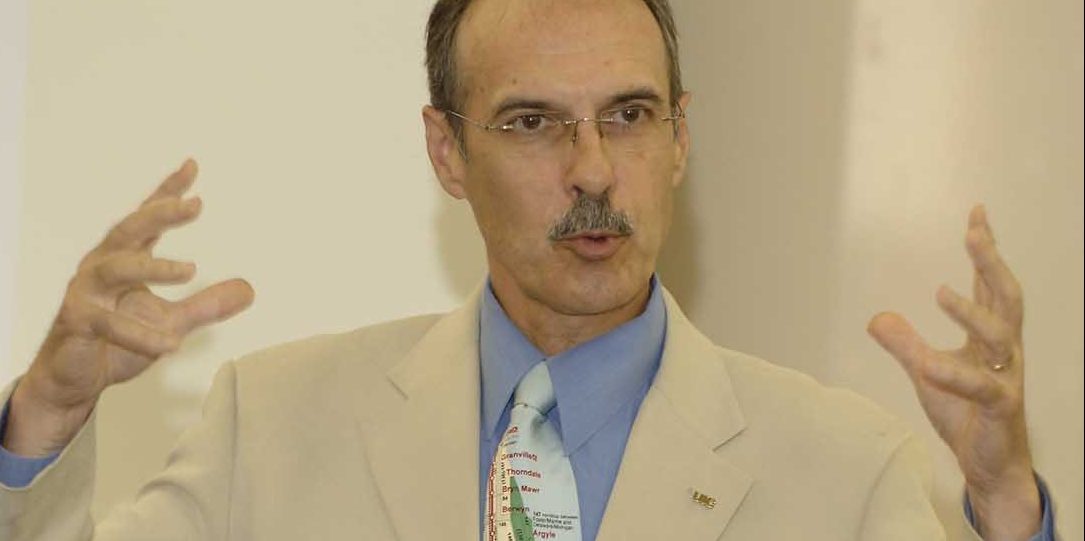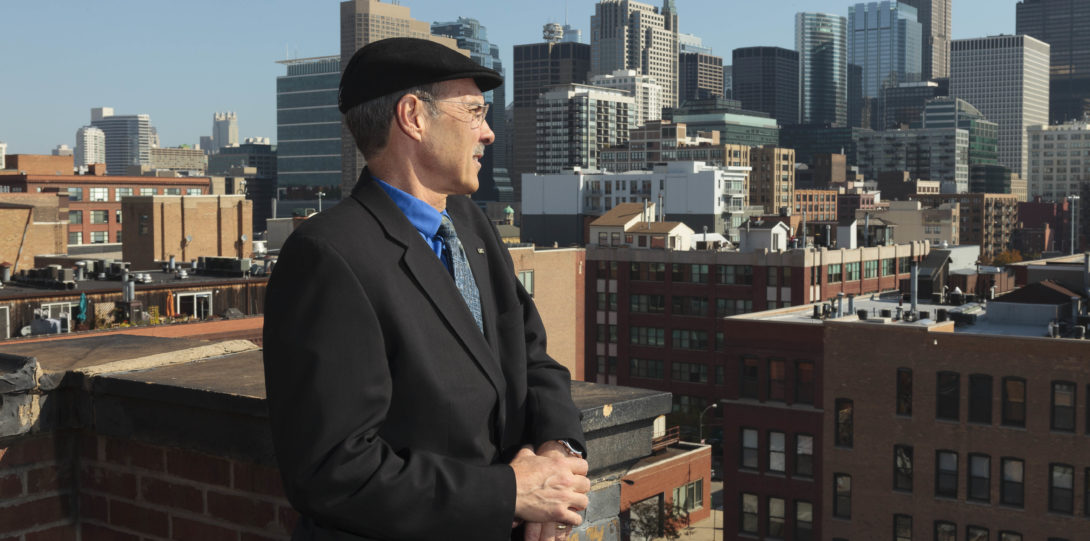Pagano Retires from UIC
Pagano Links Heading link
Leaves Legacy of a Resilient College Heading link
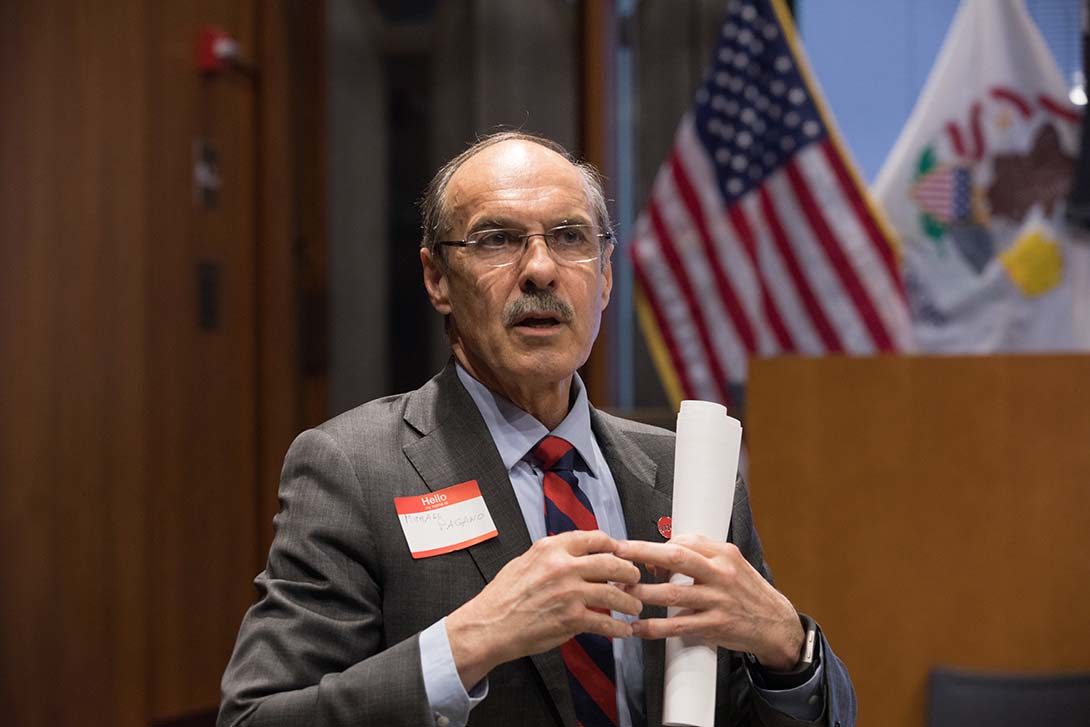
by Annie Howard
[Download this story here.]
Ask retiring College of Urban Planning and Public Affairs Dean Michael A. Pagano where his story starts, and he’ll tell you it began in many ways with the US-Soviet space race. After the launch of the satellite Sputnik in 1957, the American government poured billions of dollars into the National Science Foundation, to keep the country apace with its Soviet counterpart. Pagano’s father, Anthony Pagano, had already had his life changed by the GI Bill, allowing him to enroll in college to become a math teacher in Yuma, Arizona and avoid a hard life working in Pittsburgh’s mills. With the aid of NSF funding, he was able to return from, Arizona to his native Pennsylvania, where he pursued an EdD at Penn State.
Without that fateful course, Anthony would have never met his wife Jean, an Iowan who left the Midwest after the War and moved to Phoenix, nor would they have given birth to their son Mike in Phoenix. As it stands, the family lived on Normal Avenue in the small town of Slippery Rock, Pennsylvania for most of Pagano’s childhood. Despite the rural idyll his early life presented, Pagano credits moments of sheer happenstance like this as foundational to his life trajectory.
“The opportunities my father was able to take advantage of were opportunities that you could have never predicted: a war, the GI Bill, and a race to the moon with the Soviets,” Pagano says, including the chance meeting of his high school sweetheart, Deborah, with whom he’s been married 48 years.
As the Dean moves towards retirement at the start of the fall semester, looking back on a lifetime of accomplishments proves bittersweet. Particularly in his time within CUPPA over the last two decades, he’s witnessed changes within the program that will continue well past his retirement, fulfilling the college’s promise as a premiere research program for those interested in studying cities and government structures. While his professional career might be ending, Dean Pagano’s half-century of academic and administrative work have proven invaluable to countless others who have worked with him over the years, leaving an imprint on the college and countless colleagues, students, and friends.
—
Before he began his academic career, Pagano thought he wanted to work in the State Department. After completing a yearlong Rotary Club student exchange program in Argentina, Pagano entered college as a Latin American Studies major at Penn State, fully prepared to pursue the same field in graduate school and start a life in international affairs.
But after starting a master’s in the same field at the University of Texas-Austin, Pagano became more drawn towards academic life, as he became fascinated by questions about how governments play a role in spurring economic development, and why some do so more effectively than others. Pagano had first encountered these issues in Argentina, where the government played a larger role in economic activity than in many parts of the US; after switching into a PhD program to pursue an answer to this question, specifically focusing on urban investments into infrastructure like sewer systems and mass transit, it would become a driving motivator in his research for decades to come. (Ironically, while he had hoped to study a government agency in southern Italy that had inspired the Argentinian model, he later learned that their approach was in turn informed by the New Deal’s Tennessee Valley Authority.)
After several years of working in Pittsburgh while finishing his dissertation, Pagano, his wife, Deborah, and young daughter, Gina, moved to Oxford, Ohio in 1980, where he got a job as a political science professor at Miami University and welcomed the birth of their second daughter, Andrea. Pagano would spend the next two decades teaching at the university, as well as developing a reputation for insightful research into government financial structures. In 1985, his time as a Lincoln Government Fellow with the National League of Cities would lead to an extended partnership with the organization, culminating in writing the annual City Fiscal Conditions report for the organization from 1991 to 2021. That report, so essential to the field of city budgeting and governance, helped solidify Pagano’s reputation as a leading urban scholar, propelling his career into his time as editor of Urban Affairs Review and his move to UIC.
—
Despite his interest in researching cities, Pagano had spent most of his life in smaller communities, first in Slippery Rock, and later in Oxford, whose populations hover around 3-8,000 people. So, when the opportunity to move to Chicago to become a professor of public administration and head of the graduate public administration program at CUPPA in 2001, it was a thrilling prospect for Pagano and his wife, now empty-nesters. While many had advised them to move to the Chicago suburbs, they instead found a condo just off the bustling North Michigan corridor, too eager to take full advantage of living in one of the country’s biggest cities for the first time in their lives.
“I fell in love with the city as soon as I got here,” Pagano says. “When I arrived, I thought I was tiring of higher education, but being at UIC in the city of Chicago just gave me a surge of energy that’s continued over the last two decades.”
Soon after starting at UIC, Pagano began several projects that would help to define his experience at the college. In 2001, Pagano began co-editing Urban Affairs Review, a leading journal in the field of urban studies. Alongside co-editors Susan Clarke and Gary Gaile, Pagano helped shape much of the debate within the field during his tenure, which lasted until 2014. (Today, the journal is co-edited by UIC professors Joshua Drucker, Phil Ashton, Yue Zhang, and Jered Carr, joined by Soka University of America Professor Peter Burns.) Clarke says her experience collaborating with Pagano was one of the defining experiences of her academic career, full of late-night calls to shape the direction of the publication as it shifted into a digital age.
“Some of my favorite memories of Mike are the good humor, patience, and insight he always brought to those energetic conversations,” Clarke says. “It was fun, and the type of intellectual community many of us hoped for and too rarely find in academe.”
With his work on the City Fiscal Conditions reports and Urban Affairs Review, Pagano distilled his focus on urban governance and budgeting. In collaboration with other CUPPA faculty, he noticed a unique opportunity to establish the university as a national leader in the area.
“As I started looking at the faculty and their scholarship UIC I realized that there were so many scholars at UIC with that research focus than at almost any other university in the country,” Pagano says.
That observation led to the founding of the Government Finance Research Center in 2018, kickstarted with a million-dollar grant from the MacArthur Foundation and supported with a $2.1 million gift from an anonymous donor. Now one of the college’s most productive research centers, it has solidified CUPPA’s reputation as a leading institution in state and local government finance research. According to Urban Planning and Policy Professor Rachel Weber, that kind of center, which bridges CUPPA’s dual emphasis on urban planning and public administration, would not have happened without the kind of bridge-building efforts that Pagano brought to the college.
“I was excited that he came to CUPPA, because it felt like the departments had operated very separately until then, and he was a bridge and a connector between PA and UPP,” Weber says. “With his knowledge base, I saw him as a glue that could bring the college together, and I think that’s what he’s done as dean.”
—
After serving as the head of public administration for six years, Pagano began his tenure as interim dean for CUPPA with the retirement of Robin Hambleton in 2007. He took over the position formally the next year and has served as the dean for more than a dozen years since.
As dean, Pagano established a group initially known as the Board of Visitors, now known as the Dean’s Council, in 2015. The Council, which connects CUPPA’s efforts to the rest of the wider world through the guidance of several important civic leaders, has bolstered CUPPA’s reputation as a public-facing institution. Stephen B. Friedman, president and founder of SB Friedman Development Advisors, a development consulting firm, credits the Council with drawing in previously unconnected planning and public administration thinkers in the city to CUPPA, further enhancing student’s opportunities for future employment as well.
“The Council became a vehicle for building awareness of the College in the professional/business community and also for that community to provide feedback on the programs [CUPPA offers],” Friedman says. “These relationships can transcend Dean Pagano and provide a basis for the new Dean to continue to build these kinds of bridges.”
Through the council and other outreach efforts, Pagano has further strengthened the college’s fundraising efforts, securing nearly $18 million in donations and overseeing the creation of 14 new endowment funds during his tenure. Joshua Hahn, a MUPP alumni who currently serves as the president of the CUPPA Alumni Association, says that Pagano has transformed the college, putting it in an admirable position moving forward.
“The college is 100 percent in a better place today than it was when he got there – it’s now an established college that has a national reputation that punches well above its weight when it comes to influence and impact,” Hahn says. “Students and staff account for a lot of that, of course, but the dean always set the tone at the top. He is tireless, he is passionate and committed, and he cares greatly about the mission of the college and its people.”
As Urban Planning department head Nik Theodore notes, Pagano has served as dean during several acute challenges for higher education, including an era of declining support for public institutions, and the shift to remote learning during the pandemic in 2020. In that climate, Theodore says Pagano has provided the essential leadership that it needed.
“Despite these challenges, the academic departments have added new degree programs; expanded their undergraduate offerings; and increased their visibility locally, nationally, and internationally,” Theodore says. “Throughout this challenging period, Dean Pagano has held true to his core principles of fairness and transparency, setting the standard for future CUPPA Deans in terms of involving college stakeholders in decision-making and budget matters.”
According to Public Administration department head Jered Carr, Pagano effectively kept the college’s unique balance between academic departments and research centers humming along effectively, a kind of steadying leadership so vital in the midst of major challenges, which also included the renovation of CUPPA Hall and the adjoining Art and Exhibition Hall (AEH) in 2014-18.
“Mike was able to effectively lead the different parts of the college, keep us working as a unit, and figure out how to make the complex finances of the college work somehow,” Carr says. “He brought us through it all, kept us moving forward, and ready for the next opportunity.”
Noting Pagano’s administrative leadership, Constance Dallas, former interim co-director of the Institute for Research on Race and Public Policy noted, “Michael Pagano set the gold standard for administrators for me during my 2-year stint as Interim Co-Director of IRRP. Michael has the rare ability to see and value a person within the context of the situation. So, rather than managing the situation, Mike provided information, guidance, and support. And he’s such a great listener! I always felt valued. I always felt heard. UIC will be diminished by his loss. I wish him great adventures.”
On top of his commitments to CUPPA, Pagano also briefly served as interim dean of the College of Business Administration from 2010 to 2012 as it sought a permanent dean. He’s also contributed to multiple search committees, administrative reviews, and strategic priorities committees across the university, actions which UIC Chancellor Michael Amiridis credits with strengthening the overall position of UIC.
“I’m grateful for Dean Pagano’s dedication to UIC over the last 20 years. When I arrived in 2015, I appreciated being able to rely on his valuable insights and perspective on both the University and the city of Chicago,” Amiridis said. “UIC and the College of Urban Planning and Public Affairs have gained even more local, national and international prominence and recognition during his tenure for our work on the critical issues that define the urban condition within our societies. Dean Pagano’s impact and legacy have been significant.”
—
While the list of accomplishments Pagano has tallied up across his half-decade career speaks for itself, it’s impossible to limit his achievements to the number of books he’s written or journals he’s edited. For those who have worked alongside him throughout his career, Pagano’s academic accomplishments are only a small portion of what they find most inspiring.
Benoy Jacob, now the director of the Community Development Institute at the University of Wisconsin, Division of Extension, says that Pagano’s mentorship as a PhD advisor was instrumental in Jacob’s future success. Even today, the two remain close, something Jacob values in his own ongoing leadership role.
“Far more than his work, Mike is a wonderful mentor and friend,” Jacob says. “Even 13 years after guiding me to the completion of my dissertation, Mike continues to reach out and offer support and guidance.”
Ann Bowman, the Hazel Davis and Robert Kennedy Endowed Chair in Government and Public Service at Texas A&M, has been a longtime collaborator with Pagano, including co-authoring two books, Cityscapes and Capital: The Politics of Urban Development and Terra Incognita: Vacant Land and Urban Strategies. While she’s worked with many other scholars in her career, she says that Pagano stands out in her mind, not just as a researcher, but as an all-around interesting person.
“There’s always a nice balance, working with Mike, and he’s a wonderful research collaborator and co-author,” Bowman says. “But he’s also a bit of a Renaissance person: not just an amazing scholar, but someone who’s interested in food and art and music and culture, that just makes him fascinating.”
Pagano also brings a sense of humor and camaraderie to many of his relationships. Bill Barnes, a longtime collaborator who first met Pagano when Pagano served as a Lincoln Government Fellow at the National League of Cities (NLC), fondly remembers him showing up to Barnes’s retirement party dressed as Groucho Marx, in honor of the two’s shared love of the Marx brothers. “He gave me a small plastic duck,” Barnes says. “I guess I was supposed to ask, ‘Why a duck?” but I missed the cue.”
Chris Hoene, “Fiscal Policy Space of Cities” collaborator from NLC, now at California Budget and Policy Center, alsomakes particular note of Pagano’s collegiality and mentorship across the academic and professional spectrum, “I truly believe that the best thing about Mike is the community that he creates wherever he goes and how he welcomes us all into that community. So very few people do this well, myself included, and I can only aspire to try and live up to the model that Mike has created.
As Pagano notes, retirement is not something he’s done before: asked to reflect on what the next chapter might look like, he remains unsure, save for many postponed trips with his wife, friends, family, and his five grandchildren. Still, the chance to reflect on the impact he’s had on his colleagues, friends, and the college over the last several decades has helped the dean appreciate the legacy he’s built, one that will continue to resonate throughout the college for years to come.
